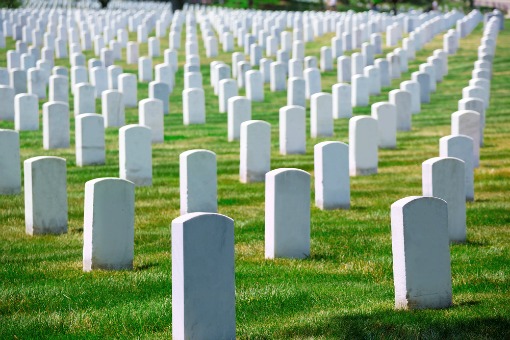 Your digital data is everywhere, and it’s never going away. That might make you feel like a celebrity, knowing that the favorite moments from your personal history are just an Internet search away.
Your digital data is everywhere, and it’s never going away. That might make you feel like a celebrity, knowing that the favorite moments from your personal history are just an Internet search away.
For other people, this always-on, always-there data can be a nightmare. When a loved one has passed away, online data can hit like a Mack truck with every birthday notification, prescheduled #tbt post or pregenerated video montage of your “best” online moments.
Digital reminders of the deceased can weigh as heavily on their loved ones as any tombstone in a cemetery. And in an age when robot dogs replace you pet, you can unlock your front door with your iPhone, and it’s considered smart to assign a beneficiary to your Facebook account, will online memorials eventually replace traditional memorials altogether?
The shape of memorials to come
If you ask some experts, the answer is eventually. “For some, online memorials can totally replace a cemetery,” says Dr. Carla Sofka, a professor of social work at Siena College in Loudonville, New York, who specializes in how grief and digital worlds collide. “But I don’t think [cemeteries] are going to be a thing of the past until we run out of space to use them.”
Online memorials entered the digital realm in the mid-1990s but didn’t gain a strong foothold until the mid-2000s, when dozens of sites starting cropping up, digital grief experts say. Google trend data shows people started searching for “online memorial” in 2006, and while there are hundreds of sites in existence, experts say it’s impossible to track them all. Today, sites like iMorial, Forever Missed and World Wide Cemetery offer grieving families customizable, community-based options ranging from free to premium solutions. For many millennials, the memorial of choice is simply a Facebook page.
But the rise of online memorials isn’t the only thing causing consumers to forgo tradition. Burial itself seems to be going out of fashion. It’s estimated that more than 44 percent of all deaths in North America will result in cremation this year, reports the Cremation Association of North America, a 29 percent increase during the last year six years alone. When that many people aren’t burying loved ones and visiting gravesites, they need a way to remember them, virtual or otherwise.
A digital double-edged sword
Dr. Heidi Horsley, assistant professor at Columbia University School of Social Work and executive director of the Open to Hope Foundation, an international organization for the bereaved, says that online memorials can be both a blessing and a curse. “The beautiful thing is you can go on Facebook or elsewhere and pay tribute to those you’ve lost,” she says. “When traffic starts to drop [on the deceased’s page], it’s distressing because all of a sudden people aren’t responding ... and it reconfirms for us the permanency that this person is never coming back. It’s hard to wrap around the fact that it’s forever.”
Grief in the face of this tragic reminder isn’t the only downside to online memorials and e-cemeteries. Sofka adds that mobile devices make it easier for some online users to express their grief on social media sites like Facebook within seconds of learning the news, without taking time to consider the possible consequences.
“Now you can be in a grocery store and find out something terrible has happened to a loved one,” says Sofka, whose book Dying, Death, and Grief in an Online Universe covers the intersection between grief and the Internet.
Nonetheless, some Facebook users find comfort in the speed with which the social media giant can circulate news. On March 1, 2015, Houston-based photographer David Bean shared the tragic news of his mother’s passing with her friends by posting it on his personal Facebook page. “She had so many friends in Hawaii, California and Texas, many of whom I had no idea how to contact,” he writes in an email. “Each time one person sees the news, they may in turn put [it] on Facebook and reach others, so it becomes a snowball effect.”
So far, no one’s said anything negative to Bean about learning of his mother’s death via Facebook. “Everyone seemed to understand why I put [it] on Facebook. I can't imagine how hard it would have been without social media,” he adds.
Despite the potential drawbacks, both Sofka and Horsley agree that online memorials have a lot to offer and may offer more benefits than a traditional gravesite. “Sometimes when we’re grieving, it’s two or three in the morning when nobody’s around,” says Horsley. “But the Internet is a virtual community 24-7 and you can read other people’s comments. It’s a way to remember a person and know you’re not alone in your grief.”
Since the cemetery can now come to you, some online memorial sites like You Mattered and Never Gone allow users to light virtual candles or leave virtual flowers at a digital gravesite. Elizabeth Fournier, owner of Cornerstone Funeral Services in Boring, Ore., has noticed the digital trend extending into other aspects of her business. “You wouldn’t believe how many requests I get for Skype visitations,” Fournier says. “The culture of death has really changed. I never knew in the beginning of my career that it would come to that.”
Thwarting identity thieves
Whether memorials are traditional or unconventional, research shows that it’s nice to have several resources for working through grief. However, multiple traffic sources create more opportunities for things to fall through the cracks, notes Julie Myhre, a digital security expert for consumer site Next Advisor.
“The most important thing people need to do before they die with their social media accounts is to make sure they are private,” Myhre urges. “It may seem like no big deal, but if you’re an identity thief, it’s just another piece of the identity puzzle that they’ll use to hack into your stuff. So anything you post should be set to strict privacy settings.”
Thieves steal the identities of the deceased by trolling the Social Security Administration’s Death Master File of all American deaths, tied to their social security information, and cross-check the information with local obituary notices or public online memorials that mention personally-identifiable information, reports ID Analytics. All it takes it a little reading, plus $995 for an annual online subscription to the Death Master File. (But according to the SSA, the data can be used to prevent fraud.)
From there, the theft continues as it would for a living victim. Thieves acquire details such as dates of birth and social security numbers so they can open new credit cards, run up debt on existing accounts or use personal information to sign up for pricey subscription-based services.
How you set up your loved one’s memorial is crucial to prevent fraudulent activity. Don’t go into specifics about the deceased’s life. Myhre advises avoiding any direct mention of their job, home address or funeral details. Even mentioning hobbies or pets’ names can help thieves decode passwords and security questions. “Don’t include too much information,” Myhre says. “You can share those personal details at the funeral.”
Even Facebook’s digital heir feature, the Legacy account, can open the door to digital burglars. While Legacy accounts make the deceased’s account private, what appear to be casual acquaintances could be digital thieves phishing for information in disguise. To be safe, keep your friends list clean so your family will be less vulnerable to scams after you pass, experts note.
[tombstones via Shutterstock]

















From Jack Lovett on March 23, 2015 :: 10:38 am
Really do not care about electronic memorials, just as I do not care for cemeteries.
I prefer a green burial, unfortunately my state (Arkansas) does not allow them, no money to be made by the mortuaries for green burials.
Reply
From Josh Kirschner on March 23, 2015 :: 10:51 am
Wasn’t familiar with green burials, but sounds like a better option than caskets, for both monetary reasons and because I’m also not a fan of indefinite preservation.
Reply